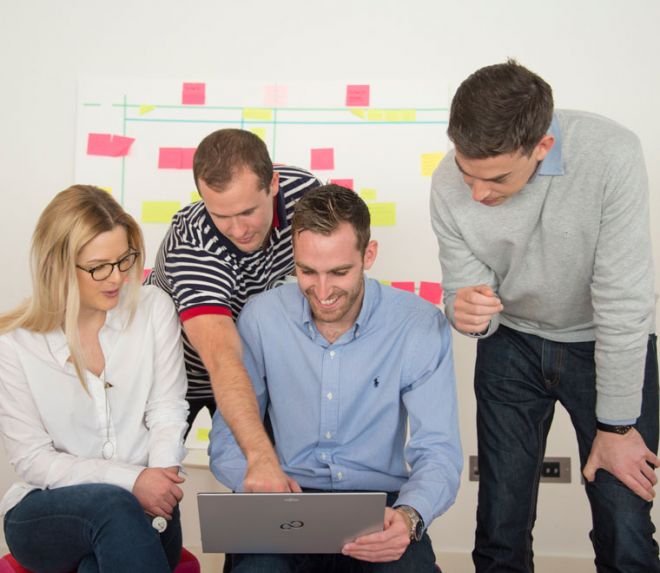Seren: Biometric user experience in video games
 Seren is a design consultancy specialising in advanced measurement techniques, including data analysis and optimisation, to unlock value from quantitative data sources.
Seren is a design consultancy specialising in advanced measurement techniques, including data analysis and optimisation, to unlock value from quantitative data sources.
The challenge
Understanding what makes a great user experience is key to success for them, and they have observed that using traditional testing methods for user experience is not fully effective for video games. This is because gamers seek fun and immersion, rather than task efficiency.
A gamer, when totally immersed, describes a sense of presence as being cut off from reality to such an extent that the game is all that matters.
Jesse Schell, an American game designer, describes this state in the following way: "When people play games, they have an experience. It is this experience that the designer cares about. Without the experience, the game is worthless."
Furthermore, the company was aware that in recent years new techniques (with origins in psychological analysis) have been introduced to provide greater insights into the experience dynamics of gaming where the user feedback is at a more emotional level. They appreciated that the continuous representation of emotion is a powerful evaluative tool that can be easily combined with proven usability techniques, such as observational analysis and player interviews.
Therefore, the company proposed the Biometric user eXperience and usability Studies (BuXuS) project with the aim of conducting an academic review of existing usability testing for video games and research into the use of biometric (psychophysiological) testing in order better to understand emotional and physical responses in the area of immersion (engagement) and flow.
Reason for collaboration
Seren sought collaboration with a university and Karen Cham, principal investigator, won the bid for Kingston. Karen found the commercial partner and supervised the work of a postgraduates student from her Masters programme who she had instructed in the required techniques. The collaboration with the Design School in the Faculty of Art, Design & Architecture delivered a refined approach for the inclusion of physiological (biometric) data in gaming, retail and digital media product-user research.
The academic partner offered mentoring support, including introductions to key players in the video-games industry. They also offered access to game designer, producer and developer resources to help shape the methodology and ensure that it would be commercially viable. The company shared a passion with their academic collaborator for the area of inquiry; they had very compatible priorities, something that made this collaboration a very successful one.
The collaboration covered aspects such as the relationship of different biometric measures to the measurement of emotion, immersion and flow. An iterative design process was applied, leading to a refined user experience based methodology to incorporate key physiological data from users. This provided insight on users' emotional and behavioural responses to different video game experiences. These results were presented in a time-line series of emotion (biometric incidents) using a range of presentation styles adapted to meet the requirements of game designers. Similarly, specific game elements were reviewed in terms of relative biometric measures to validate effectiveness or player response.
The overall initial findings revealed a relationship between aspects of attention levels and gaming elements, such as ratings, level design and genre-specific mechanics. This led to the exploration of algorithms to predict the level of player-immersion and validation of game-design elements.
Impact on the business
Seren gained a wider understanding of biometric methodologies and the development of related tools. This included exploring the potential of biometric methodologies for understanding immersive user experiences. So, it has expanded their toolkits and broadened their methodologies in data gathering and analysis, and immersive user experience design. It also highlighted the potential for biometric methodologies in other aspects of their existing business, such as neuromarketing.
All of these innovations to their portfolio are expected to create new business opportunities within their existing markets. The collaboration also provided networking opportunities, raising their profile in the video-gaming industry. Overall, this should enable Seren to gain new clients within their existing markets, and increasingly from the video-gaming industry. So, they expect to create new full-time and part-time positions to support this growth.
"We benefited from the expertise of our academic partner and developed tools that we would not have been able to do by ourselves." Terry Heath, Seren.
Reflections for the future
Seren gained commercially viable research outputs through the collaboration, and connections to relevant third parties. The project allowed for the methodology to be refined by iterative design and testing; this resulted in a strong methodological basis for a sector leading approach.
Through data analysis from test sessions, a fuller understanding was gained into the relationship between biometric feedback and key user-experience factors in video games. This allowed for the exploration of predictive algorithms relative to different game genres.
Read more success stories.
Contact us
Partnerships and Business Engagement Team

Contact us
Partnerships and Business Engagement Team